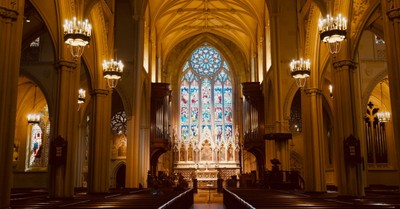The Power of My Favorite Christmas Ornament
The Washington Post reports that the coronavirus pandemic has “produced a bumper crop” of wedding engagements.
For example, at the Grand Canyon, one of the world’s most popular spots for marriage proposals, inquiries about bookings and proposal packages have doubled since last year. A jewelry retailer reports that the third quarter of this year saw double-digit percentage growth in engagement-ring sales compared to the same period in 2019.
And we’re not even to Christmas yet. According to experts and social media sites, Christmas Eve and Christmas Day are the most popular days of the year to propose marriage.
Christmas is especially welcome during a pandemic, but the season is good for us even in more normal years. For instance, studies show that decorating our homes for Christmas can make us happier people.
Counselors say such decorations help us reconnect with happy memories from our childhoods. Even if we have lost a loved one, decorating for the holidays may remind us of good times with them in the past and make us feel more connected with them in the present.
Of course, celebrating Christmas in a pandemic is challenging. From The Nutcracker to church pageants, holiday productions have gone virtual this year.
Here’s the good news: Jesus has not. As meaningful as experiencing the Christmas holidays can be, experiencing Christ himself is far better.
My favorite Christmas ornament
But there’s a catch: to encounter the Baby of Bethlehem, we must reverse our cultural thinking.
From the time we were small children, we’ve been taught that Christmas is about us. “What do you want for Christmas?” is the question we were asked by parents and shopping mall Santas alike. If we are blessed to become parents, we soon ask it of our children. In non-pandemic years, we ask each other what we would like to eat for Christmas and where we would like to celebrate the day.
By contrast, the first Christmas was all about Christ. Mary was invited to become the mother of “the Son of the Most High” (Luke 1:32) and Joseph to be his adoptive father (Matthew 1:20-21). The angelic host celebrated neither the couple nor the shepherds but “a Savior, who is Christ the Lord” (Luke 2:11).
My favorite Christmas ornament depicts Santa Claus kneeling and worshiping Jesus in the manger. That’s how Christmas should be understood and celebrated this week.
Said succinctly, it’s not about us.
Entering the first church ever built
The church built over the site of Jesus’ birth makes this point in a profound way.
When I lead study tours to Israel, we always visit the Church of the Nativity in Bethlehem. This was the first church building constructed under the reign of Constantine (ca. AD 330). The original structure was burned and destroyed in the sixth century, then rebuilt by Byzantine Emperor Justinian (482–565).
The Door of Humility provides entrance to the massive church. It was created to keep looters from driving carts into the church and to force even the most important visitors to dismount from their horses to enter the holy place. Every time I bend down to enter the church that commemorates Jesus’ birth, I remember again that the best way to come to a King is in humility.
Even David, the most revered of all Jewish kings, once prayed, “I, through the abundance of your steadfast love, will enter your house” (Psalm 5:7). He knew he had access to the King of the universe only because of his “steadfast love” (the Hebrew word is hesed, meaning “unconditional grace and mercy”).
By contrast, we sometimes think we deserve to pray because we are praying, as if our religious activity impresses God and earns us the right to his presence. This is never true. We pray in response to grace, not from merit.
In other words, if you and I would experience the transforming grace of Christmas, we must admit we need what only Christ can give.
A song that invites us to joy
Henri Nouwen testified: “It is hard to believe that God would reveal his divine presence to us in the self-emptying, humble way of the man from Nazareth. So much in me seeks influence, power, success, and popularity. But the way of Jesus is the way of hiddenness, powerlessness, and littleness.
“It does not seem a very appealing way. Yet when I enter into true, deep communion with Jesus, I will find that it is this small way that leads to real peace and joy.”
Would you make time today to enter through the door of humility to the throne room of grace?
To this end, I encourage you to worship with this song by Big Daddy Weave. It contains lyrics that offer God’s invitation to us today:
You’re bigger than what I see
It’s You in exchange for me
‘Cause even the impossible is your reality.
Jesus I believe.
Do you believe?
Publication date: December 23, 2020
Photo courtesy: Free Photos/Pixabay
Jim Denison, PhD, is a cultural theologian and the founder and CEO of Denison Ministries. Denison Ministries includes DenisonForum.org, First15.org, ChristianParenting.org, and FoundationsWithJanet.org. Jim speaks biblically into significant cultural issues at Denison Forum. He is the chief author of The Daily Article and has written more than 30 books, including The Coming Tsunami, the Biblical Insight to Tough Questions series, and The Fifth Great Awakening.
The views expressed in this commentary do not necessarily reflect those of CrosswalkHeadlines.
For more from the Denison Forum, please visit www.denisonforum.org.
The Daily Article Podcast is Here!



















